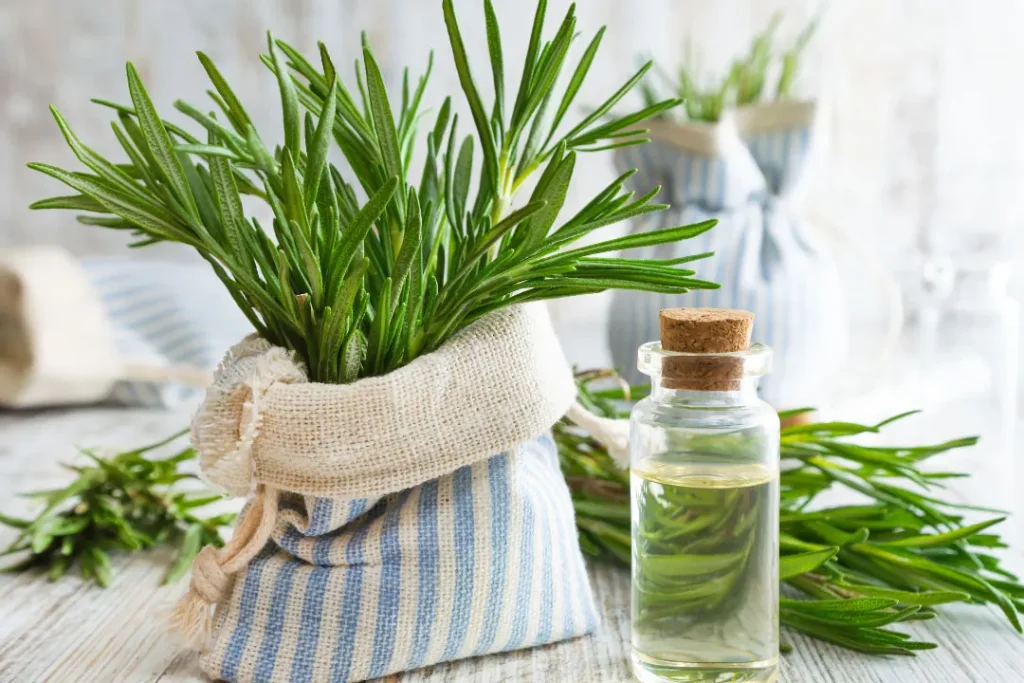The mint genus includes the woody perennial herb rosemary (Rosmarinus officinalis). (Lamiaceae). Although it originated in the Mediterranean area, it is now cultivated all over the world for both culinary and medicinal purposes. The ability of rosemary to improve cognitive function, such as concentration and memory, along with its antioxidant and anti-inflammatory properties has led to an increase in its popularity in recent years. This piece will cover the characteristics of rosemary, its health advantages, the best dosage, its side effects, possible drug interactions, and other pertinent details about the responsible use of this supplement.
You May Also Like:
5 Great Natural Nootropics and How They Work
The Best Nootropics for Learning and Memory: 5 Top Brands Reviewed
Nature of Rosemary
Numerous beneficial substances, including rosmarinic acid, carnosic acid, carnosol, and ursolic acid, can be found in rosemary. These ingredients are what give rosemary its therapeutic benefits, such as antioxidant, anti-inflammatory, and antimicrobial effects. Additionally, rosemary contains essential oils, which are responsible for its distinctive flavor and aroma. The 3 primary rosemary essential oils include 1,8-cineol, camphor and alpha-pinene.
Unlock Gorgeous Hair with Rosemary Oils and Herbs for Scalp Nourishment—Click Now!

Health Benefits of Rosemary
Rosemary has a number of health advantages, one of which is the possible improvement of cognitive function. The bioactive components in rosemary have been shown to enhance mood, memory, and concentration. For instance, research in the publication, Therapeutic Advances in Psychopharmacology discovered that taking rosemary extract enhanced healthy adults’ cognitive function and mood. Another study showed that older adults’ cognitive function was improved when rosemary essential oil was inhaled as shown in the research studies done in the journal, Psychopharmacology.
Additionally, rosemary has anti-inflammatory and antioxidant properties that may help prevent chronic illnesses like cancer, diabetes, and cardiovascular disease. In addition, rosemary possesses antimicrobial qualities that could aid in preventing and treating infections brought on by bacteria and fungus.

Chemistry of Rosemary
Numerous bioactive substances found in rosemary add to itsmedicinal properties. Rosmarinic acid, a polyphenolic compound with antioxidant and anti-inflammatory properties, is one of the major constituents of rosemary. The bitter flavor of rosemary comes from high levels of rosmarinic acid present in the stems of the plant. According to research, rosmarinic acid has the ability to treat diseases and inflammation brought on by oxidative stress because it can scavenge free radicals and reduce the production of inflammatory cytokines.
Carnosic acid is another bioactive component that can be isolated from rosemary. It is a diterpenoid that has antioxidant, anti-inflammatory, and anti-cancer effects. The essential oil of rosemary contains significant amounts of carnosic acid, which gives rosemary its distinctive scent. By preventing the production of reactive oxygen species and inflammatory cytokines like rosmarinic acid, carnosic acid can also help in defending against oxidative stress and inflammation.
Another diterpenoid found in rosemary is called carnosol. Carnosol has anti-inflammatory and antioxidant effects. Similar to carnosic acid, carnosol gives rosemary essential oil its fragrance. It is also present in large amounts in this oil. Carnosol has similar properties as rosmarinic acid and carnosic acid which prevent oxidative stress and inflammation by scavenging free radicals. This in turn prevents the generation of inflammatory cytokines.
The triterpenoid ursolic acid, which is present in rosemary, has anti-inflammatory and antitumor effects. The leaves of rosemary contain significant levels of ursolic acid, which gives them their astringent flavor. According to studies, ursolic acid can suppress the creation of inflammatory mediators and encourage cancer cell apoptosis.

Physiological Mechanisms of Action of Rosemary
The bioactive chemicals in rosemary have a variety of effects on the body and brain. Rosmarinic acid and carnosic acid, for example, are powerful antioxidants that can neutralize free radicals and defend cells against oxidative stress. Furthermore, rosmarinic acid and carnosic acid have been shown to modulate brain neurotransmitter systems such as acetylcholine and dopamine, which are involved in learning, memory, and mood control.
Additionally, rosemary essential oil contains 1,8-cineol, which has been shown to enhance cognitive function by increasing cerebral blood flow and oxygen delivery to the brain. Increased blood flow and oxygen delivery have been shown to improve neural activity and cognitive ability.
Achieve Healthy Hair and Scalp with Top Rosemary Oils and Herbs—Discover Here!

Optimal Dosage of Rosemary
The ideal dosage of rosemary for brain enhancement is remains undiscovered. The majority of trials used rosemary extract or essential oil at doses of 300 to 600 mg/day or 1 to 3 drops, respectively. It is essential to note, however, that the bioavailability of rosemary compounds varies depending on the individual and on the preparation process. As a result, it is advised to begin with a low dose and progressively increase it while keeping an eye out for any adverse effects.
Side Effects of Rosemary
Rosemary is usually regarded as safe when consumed with food and in low quantities. However, when a higher dose is consumed, it can trigger stomach upset, headaches, and allergic reactions. Seizures can also be caused by high doses of rosemary, particularly in people who have a history of epilepsy. As a result, before taking rosemary supplements, talk to your doctor, particularly if you have a medical condition or are taking medication.

Potential Substance Interactions with Rosemary
Certain drugs, such as blood thinners, diuretics, and ACE inhibitors, may interact with rosemary. As a result, if you are taking any medication, you should speak with your doctor before taking rosemary supplements.
Responsible Use of Rosemary
To ensure the most responsible use of rosemary, select a high-quality supplement from a trustworthy manufacturer. It is also critical to stick to the suggested dosage and keep an eye out for any side effects. Additionally, it is strongly recommended that you speak with a healthcare provider, particularly if you have a medical condition or are taking medication before taking rosemary as a supplement.
Maximize Your Hair’s Potential: Rosemary Oils and Herbs for a Healthy Scalp—Best Deals!

Rosemary (Rosmarinus officinalis):
Conclusion
If you want to perform better cognitively either for professional or academic goals, rosemary supplement might be able to help you. Rosemary supplementation has been demonstrated to enhance the quality of memory and it also increases mental alertness. In addition, rosemary supplements also boost the immune system and reduce the prevalence of cancer which may contribute to the general well-being of a person. However, rosemary will bring some negative side effects to the body when consumed in inappropriate dosage or with unsuitable substances so it is best if you speak with a doctor before beginning a new supplement regimen. You should also select rosemary from a reputable source to ensure that the supplement is of superior quality.

References:
- Aromas of rosemary and lavender essential oils differentially affect cognition and mood in healthy adults. International Journal of Neuroscience, 113(1), 15-38. Retrieved from: https://www.tandfonline.com/doi/abs/10.1080/00207454.2002.10474394
- Short-term study on the effects of rosemary on cognitive function in an elderly population. Journal of Medicinal Food, 15(1), 10-17. Retrieved from: https://www.liebertpub.com/doi/10.1089/jmf.2011.0005
- Effect of citrus flavonoids, naringin and naringenin, on metabolic syndrome and their mechanisms of action. Advances in Nutrition, 5(4), 404-417. Retrieved from: https://academic.oup.com/advances/article/5/4/404/4568623
- In vitro pharmacological activities and GC-MS analysis of different solvent extracts of Lantana camara leaves collected from tropical region of Malaysia. Evidence-Based Complementary and Alternative Medicine, 2016. Retrieved from: https://www.hindawi.com/journals/ecam/2016/4726593/
- The Efficacy of Topical Hyaluronic Acid 0.2% in the Management of Symptomatic Oral Lichen Planus Retrieved from: https://pubmed.ncbi.nlm.nih.gov/26894175/
Important Note: The information contained in this article is for general informational purposes only, and should not be construed as health or medical advice, nor is it intended to diagnose, prevent, treat, or cure any disease or health condition. Before embarking on any diet, fitness regimen, or program of nutritional supplementation, it is advisable to consult your healthcare professional in order to determine its safety and probable efficacy in terms of your individual state of health.
Regarding Nutritional Supplements Or Other Non-Prescription Health Products: If any nutritional supplements or other non-prescription health products are mentioned in the foregoing article, any claims or statements made about them have not been evaluated by the U.S. Food and Drug Administration, and such nutritional supplements or other health products are not intended to diagnose, treat, cure, or prevent any disease.
Top Rosemary Supplements for Vibrant Hair and Scalp Health—Find Your Ideal Match!



